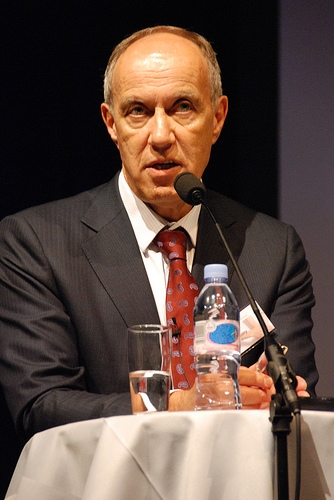

Photo by dkpto @ Flickr, Creative Commons Attribution 2.0 Generic
BACK we go to the subject of software patents, which we have not covered quite so thoroughly as of late.
Last June, the Swiss Press Club held a launch for the Global Innovation Index at which various speakers were invited to talk about innovation. After the head of CERN and the CEO of the Internet Society spoke about how important it was that the Web's underlying technology hadn't been patented, Francis Gurry, the Director General of the UN's World Intellectual Property Organization (WIPO), took the mic to object.
In Gurry's view, the Web would have been better off if it had been locked away in patents, and if every user of the Web had needed to pay a license fee to use it (and though Gurry doesn't say so, this would also have meant that the patent holder would have been able to choose which new Web sites and technologies were allowed, and would have been able to block anything he didn't like, or that he feared would cost him money).
Ultramercial v. Hulu: Computer Programs and Patentable Subject Matter
[...]
Software is patentable Layered on top of this finding is the court's rejection of the argument that software programming amounts to abstract subject matter. "The digital computer may be considered by some the greatest invention of the twentieth century, and both this court and the Patent Office have long acknowledged that "improvements thereof" through interchangeble software or hardware enhancements deserve patent protection. Far from abstract, advances in computer technology—both hardware and software—drive innovation in every area of scientific and technical endeavor." Slip Op. at 12.
This holding is in tension with the Federal Circuit's recent opinion in Cyber Source Corp. v. Retail Decisions, Inc., No. 2009-1358 (Fed. Cir. Aug. 16, 2011), in which a panel consisting of Judges Bryson, Dyk and Prost concluded that a method of verifying a credit card transaction over the Internet constituted an unpatentable process. While the panel in Ultramercial recognized this tension, it distinguished Cyber Source as an instance of "purely mental steps." Ultramercial Slip Op. at 13 (emphasis in original). The line, at least from the point of view of this panel, thus lies somewhere between logical steps that humans can perform without the aid of a computer versus those that require a computer to carry out.
"To paint software as "machine" is like painting mathematics as "abacus" or comparing a musical piece to "gramophone" to justify patents on drum beats, vocals, or a short sequence of words."How much should we be willing to remove from our thoughts and actions just to feed a redundant industry that prevents small businesses from threatening the status quo? These are mere gate keepers. Just watch Microsoft as it gets a trademark for retail store plans (no, it is not a joke). The Register says that "Microsoft has been awarded a trademark on its design for a store selling all things high tech." (trademark registration #4036534).
How many shops are infringing? Should they all be shut down or be forced to pay Microsoft? It is a little reminiscent of the Lindows case.
The Economist, a reputable paper which is neither run by lawyers nor written by engineers, ought to view this whole pyramid/MLM scheme of a system as a bad idea. Not so long ago it posted some rants against the patent system and now it's airing a piece titled "programmed nonsense". To quote the relevant parts:
The message is finally getting through. When the White House opened a website earlier this month for people to create and sign petitions they feel passionate about, one immediate favourite asked the president to “direct the [USPTO] to cease issuing software patents”. The petition garnered more than 12,000 signatures in the first few days. The White House has promised to respond to any petition that collects 5,000 signatures during the first month.
Software patents and business-method patents (invariably based on some software algorithm) are unlike any other type. As a rule, mechanical, chemical, material and even biological inventions and discoveries are concerned with some novel feature that can be measured and uniquely defined. But software programs deal almost exclusively with mathematical relationships that are well known and widely used. In writing software, programmers do not have to make novel, serendipitous discoveries, as inventors in other fields do. In many ways, that makes programming a good deal easier, and certainly more predictable, than inventing.